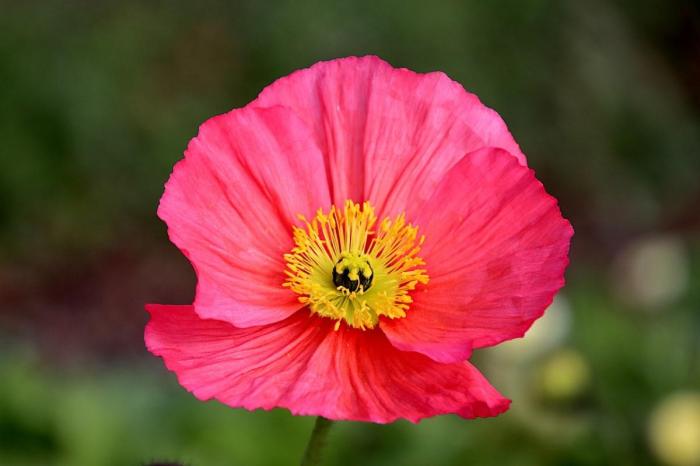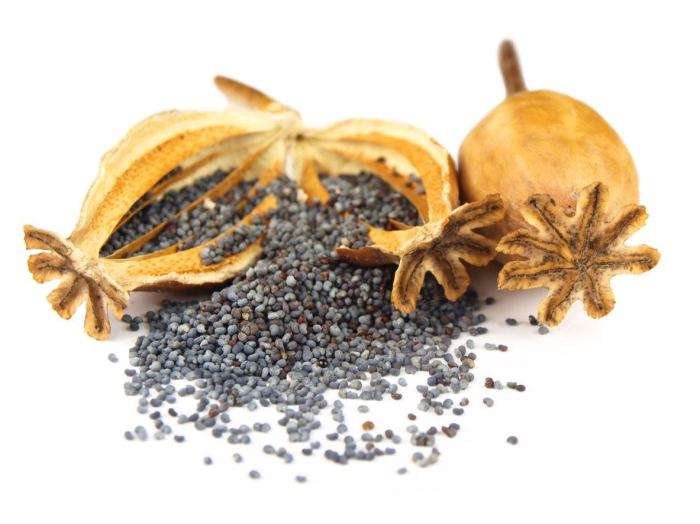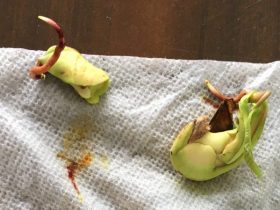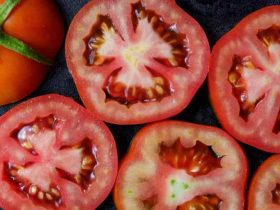Poppy Seed Bagels and Germination
Can you plant poppy seeds from a bagel – The seemingly humble poppy seed bagel offers an intriguing possibility: cultivating poppy plants from the seeds embedded within. However, the journey from bagel to blooming poppy is fraught with challenges. This exploration delves into the viability of bagel poppy seeds, the germination process, and the legal considerations involved.
Poppy Seed Germination Process
Poppy seed germination requires specific conditions. Optimal temperatures range from 65-75°F (18-24°C), with sufficient moisture to keep the seeds hydrated but not waterlogged. While light isn’t strictly necessary for initial germination, adequate sunlight is crucial for seedling development. Poppy seeds intended for consumption are often processed to enhance their shelf life, potentially affecting their germination capabilities compared to seeds specifically bred for planting.
Challenges in Germinating Bagel Poppy Seeds

Source: gardeningtips.in
Germinating poppy seeds from a bagel presents unique difficulties. The baking process subjects the seeds to high temperatures, potentially impacting their viability. Furthermore, bagel poppy seeds may have been exposed to preservatives or other food additives that could inhibit germination. Fresh bagel seeds are likely to have a higher germination rate compared to seeds from an older, stale bagel due to reduced moisture content and potential degradation.
Germination Rate Comparison: Fresh vs. Stale Bagels
A direct comparison requires controlled experiments. However, anecdotal evidence suggests a significant difference. Fresh bagel seeds, with their higher moisture content and less exposure to environmental factors, are expected to exhibit higher germination rates.
Viability of Bagel Poppy Seeds, Can you plant poppy seeds from a bagel
Several factors influence the viability of poppy seeds after baking. Heat treatment during the baking process can damage the seed embryo, reducing germination potential. The presence of preservatives or other additives in the bagel dough may also inhibit germination. Storage conditions of the bagel, including exposure to moisture and temperature fluctuations, further impact seed viability.
Impact of Heat and Processing on Seed Viability
High temperatures during baking can denature enzymes crucial for seed germination. Moreover, processing techniques, such as roasting or toasting, can further reduce viability. The longer the seeds are subjected to high heat, the lower the likelihood of successful germination.
Viability of Poppy Seeds from Different Bagel Brands
This table presents hypothetical data to illustrate the potential variation in germination rates among different bagel brands. Actual results may vary depending on numerous factors, including seed source, processing methods, and storage conditions.
| Brand | Seed Source | Germination Rate (%) | Observations |
|---|---|---|---|
| Brand A | Unknown | 15 | Many seeds showed signs of damage |
| Brand B | Likely from a specific supplier known for high-quality seeds | 35 | Seeds appeared relatively undamaged; germination was uneven |
| Brand C | Unknown | 5 | Very few seeds germinated; most appeared damaged or dead |
| Brand D (Organic) | Likely organic supplier | 25 | Slightly better germination than non-organic brands; some seeds showed signs of damage |
Planting and Growing Poppy Seeds

Source: gardeningknowhow.com
Successfully growing poppy plants from bagel seeds requires careful attention to detail. The following steps Artikel the process, emphasizing crucial considerations at each stage.
- Seed Preparation: Carefully extract poppy seeds from the bagel, ensuring they are clean and free from any dough residue. Rinse gently.
- Soil Preparation: Use well-drained potting mix or garden soil. Ensure the soil is loose and aerated to facilitate root development.
- Planting: Sow seeds lightly onto the soil surface, as poppy seeds require light to germinate. Gently press them into the soil, but do not cover them deeply.
- Watering: Keep the soil consistently moist but not waterlogged. Overwatering can lead to seed rot.
- Sunlight: Provide ample sunlight (at least 6 hours daily) for optimal growth. Insufficient sunlight will result in weak, leggy plants.
- Fertilization: Use a balanced fertilizer sparingly, following the product instructions. Over-fertilization can harm the plants.
- Harvesting: Once the seed pods turn brown and dry, carefully harvest them. Allow the pods to dry further before extracting the seeds.
Legal Considerations and Potential Risks
Cultivating poppies carries legal implications. The legality of growing poppies varies significantly depending on location and the specific poppy species. Opium poppies (Papaver somniferum), known for their opium production, are heavily regulated or outright banned in many countries. However, other poppy species, such as the breadseed poppy (Papaver somniferum var. album), are widely cultivated for their edible seeds and pose no legal concerns.
Distinguishing Poppy Species
A visual representation would show several poppy species side-by-side. The opium poppy would be depicted with its characteristic large, often purple flowers and a bulbous seed pod. Breadseed poppies would be shown with similar flowers but potentially smaller seed pods. Other ornamental poppy varieties would be included, showcasing their diverse flower colors and shapes. Labels would clearly indicate the species name and typical uses (e.g., opium production, food, ornamental).
While you likely won’t successfully cultivate a poppy field from bagel poppy seeds, the timing of planting is crucial for successful germination. Consider this when thinking about other seeds; for instance, determining the optimal time to plant, as detailed in this guide on when to plant grass seed oregon , is essential for a healthy lawn. Just as with grass seed, the success of poppy cultivation hinges on proper timing and conditions, even if your seeds came from a less-than-ideal source.
Alternative Uses for Bagel Poppy Seeds
Beyond planting, bagel poppy seeds offer culinary versatility. Their small size and slightly nutty flavor make them a valuable addition to various dishes. Their nutritional value is comparable to poppy seeds from other sources, providing fiber and some essential nutrients.
Storing and Preserving Bagel Poppy Seeds
Store leftover bagel poppy seeds in an airtight container in a cool, dark, and dry place to maintain their quality and prevent spoilage. Proper storage can significantly extend their shelf life.
Commonly Asked Questions: Can You Plant Poppy Seeds From A Bagel
Are all poppy seeds the same?
No, there are many poppy varieties, some containing opium alkaloids and others not. Those on bagels are generally the non-opium type.
How long do poppy seeds remain viable?
Viability depends on storage conditions. Properly stored seeds can remain viable for several years, but those exposed to heat and moisture will have a shorter lifespan.
What if I accidentally plant an opium poppy?
Cultivating opium poppies is illegal in many places. If you suspect you have one, contact your local authorities.
Can I use any type of soil?
Well-draining soil is best for poppy cultivation. Amend heavy clay soils with compost to improve drainage.



